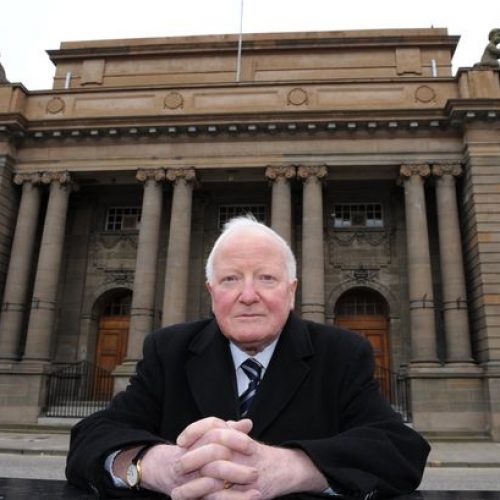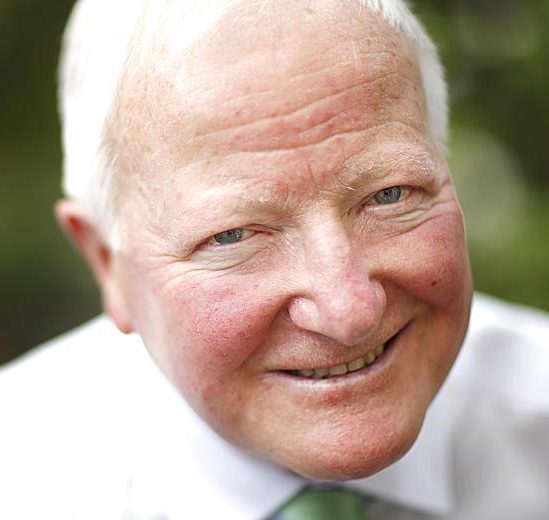On Friday 18 September Vivian Linacre, a few years into his nineties, slipped away from us in his Perth home after an illness born bravely. Vivian was a regular contributor to ThinkScotland and in 2014 provided this essay for our book ‘The Positive Case’ which was published before the independence referendum. As a token of thanks and respect for his many thoughtful and lively articles we shall be republishing some of them in the coming weeks, along with an obituary being prepared currently.
THERE ARE metropolitans and cosmopolitans and Liverpolitans, of which I am one, as were my forebears for centuries; a mix of Irish, Welsh, Scottish and immigrants from the Empire, including a huge influx through trade in sugar, cotton and slaves. So to my tribe the campaigns for and against Scottish separation from the UK are the merest parochial gossip.
Even the pro/anti-EU debate is of only local interest to Glaswegians and Liverpolitans, who are equally creatures of the wide world – kin to Australians, New Zealanders, South Africans, Canadians and others from the British diaspora rather than the European back yard. There is the first argument in ‘The Positive Case’ for the Union; that we would rather gaze at horizons than at our own navels.
The richness of British culture is exemplified by the alternative origins of my family name; either Celtic –“lin” meaning a pool as in numerous Gaelic names, e.g. ‘Dublin’ just opposite Liverpool, referring to the estuaries of the Mersey and Liffey respectively, with ‘acre’ and its many variants an Anglicised corruption — and the other Latin, to mean ‘field of flax’ (a ‘bleaching green’). But after nearly a thousand years it doesn’t matter.
The absurdity of Scottish separatism is well illustrated, too, by a common occurrence in the late 1930s at the HQ of the Liverpool Scottish regiment (eventually absorbed into the Queen’s Own Cameron Highlanders) when a young man keen to enlist as an officer would present himself to the recruiting sergeant, only to be asked if he had property in Scotland (the tradition, by then only a myth, being that officers were sons of Scottish landed gentry) and then told, in response to his apologetic negative, “Never mind, sir, tomorrow morning take a pair of trousers in to Pullars shop here in Castle Street for cleaning and by the evening they will be in a van on their way to Perth, so next day you can come back and answer my question in the affirmative”. An old joke in rugby circles is that if your granny has once flown over Falkirk you are qualified to play for Scotland; though the test for English selection is not quite so rigorous.
One of my dearest friends was Fritz Spiegl, whose family got him out of Austria as a child on a boat to Liverpool, a city with which he “fell violently in love”, as he did with the English language, so he never left. Within a few years he became principal flute-player with the (Royal) Liverpool Philharmonic Orchestra and later wrote books on the English language. He even published a “Dictionary of Scouse” (the Liverpool dialect) and a treatise, “Lern Yerself Scouse”, both by his imaginary author, Linacre Lane BSc [Batchelor of Scouse], the name of a well-known street that amused him. But it was his interest in the British Weights and Measures Association (of which I was then director and am now a trustee) that led him to inform me that “I was born into a metricated country but managed to get out before it did me too much harm.”
He was a natural musical genius, composing the famous theme for the early 1960s TV crime series set in Liverpool, “Z Cars” (based on a girls’ skipping song which he heard in the streets and transcribed for a Belfast fife band), and the medley of traditional melodies from all four British countries (O Danny Boy, Men of Harlech, Greensleeves, Ilkley Moor, Lilli-burlero, Bonny Banks of Loch Lomond, etc) which heralded the shipping forecast that started Radio 4 early every morning until it was stupidly cut in 2006 (mercifully after he had died): officially ‘The UK Theme’ but to him “The Great British Sandwich”. He also presided over “Start the Week”. An Austrian Jew and supremely cultured man of the world, he personified for me the very best of Britishness, the personification of ‘The Positive Case’.
So Scottish nationalism, which in my childhood still reflected a distinct identity, is meaningless today, mainly because of vast increases in both ethnic diversity and mobility of population. In 1939 I was one of three boys to win grammar school scholarships from Knotty Ash Primary School, one of the others being Ken Dodd. I knew far more then about Argentina or Japan than about Scotland. But the outbreak of war put my father into a government job and posted to Edinburgh, where I was interviewed at George Heriot’s School very briefly by the School Clerk (exempt from National Service because of a missing arm) who presumed that I was too young to go into the Senior School, but conceded after I had answered his only two questions, which significantly were for the dates of the Battles of Flodden and Bannockburn. The few English boys were stigmatized as were the Jewish boys; so, like them, I became a reclusive swat.
After National Service, I read History and English at Edinburgh University, where Scottish Literature as well as Scottish History were (and presumably still are) taught as separate subjects, so that a degree course could exclude the Scottish varieties altogether or concentrate on them. Their opposing treatments of (e.g.) the Reformation were very odd, though that won’t really matter sixty years later because of the Kirk’s severe decline; but I wonder how the respective schools are approaching the Referendum?
My first year coincided with the first year of the Edinburgh International Festival, becoming a friend of its true progenitor, Harvey Wood of the British Council, a past office-bearer of the (former) Philomathic Society of which I later became Senior President. So I discovered the paradise of classical music, opera and European theatre, as well as civilized conversation. Edinburgh as one of the world’s cultural capitals is perfect, a little sister to London and developing proportionately, while big brother in the South has become cultural capital of the world. This unique inter-city relationship is one of the many unsung blessings of the Union.
‘Celebrity’ had not yet been invented, so a hothouse student could freely meet and engage with famous literary figures. I could join the salons and soirees and sometimes visit the homes of Compton Mackenzie, Eric Linklater, Moray McLaren and the Gaelic poets, or join them in their favourite Rose Street pubs. Yes, Scottish nationalism was always in the air, but so was fascism and Marxism – Hugh MacDiarmid seemed to espouse all three. Scottish nationalism’s few champions of public stature were united only in support (ranging from the idealistic to the anarchic to the insurrectionist) for the numerous liberation movements in British dominions and colonies, with which they sought to identify Scottish independence. By the mid-1960s, once the Empire had been dissolved, that global view was lost, since when Scottish nationalism has become introverted, with no justification except self-justification; i.e. expansion of the political classes and state apparatchiks for their own benefit.
As I have long advocated, the perfect permanent cure for this lingering malaise is literally to capitalise on the London-Edinburgh axis, which already works so well culturally, by polarising the metropolis and the state capital as for New York-Washington, Toronto-Ottawa, Sydney-Canberra, Lagos-Abuja, Johannesburg-Pretoria, etc. Edinburgh is an ideal capital for the UK, while shaking Westminster out of London would greatly relieve congestion and make government far more efficient and accessible. Scotland already has the Glasgow-Edinburgh axis, but their performance would not improve following independence because in such a small country Edinburgh could not afford to concentrate on government as its main function so would continue to wastefully duplicate many of Glasgow’s functions. In any event, Edinburgh would be emasculated by Labour as successor to the SNP, exercising remote control of the new national government at Holyrood from its power-base in Glasgow – the worst of all worlds. But on a UK scale the London-Edinburgh dualism is the ideal solution.
Many years ago, ‘The Economist’ ran a competition to propose the ideal location for a British Brasilia and came up with Marston Moor in Yorkshire, but that would have meant starting on a bare site, whereas Edinburgh is ready made; and the London exodus could be planned over several years. Whole departments or even ministries could be scrapped in the process, yielding economies that would greatly reduce the payback time for the total cost of the ‘flitting’. ‘Recycling’ the capital of the UK is as revolutionary a strategic plan as moving Heathrow into the Thames Estuary (or scrapping National Insurance contributions together with Council Tax and business rates), and equally urgent: but with the incalculable long-term benefit, culturally as well as economically and politically, of eradicating the cancer of nationalism once-and-for-all. It is the third and final stage of unification: first the Union of Crowns in 1603, then the Union of Parliaments in 1707, culminating in the Union of Capitals in 20(?). Even leaving aside the event’s momentous historical, cultural and international significance, it is abundantly worth-while purely as a glorified administrative reform. So let’s give it a specific, high priority.
After eleven years in Liverpool followed by thirteen in Edinburgh, nine years in London followed for professional training and advancement. A different world, oblivious to Scotland: certainly not hostile, as paranoid nationalists complain, but merely indifferent, as New York is to Seattle or Sydney to Perth or Paris to Bordeaux. Only the rich actually live in London: the rest belong either to a clearly defined inner district such as Hackney or Clapham or Shepherd’s Bush or to commuterland in what we used to call the ‘Home Counties’ or even further afield in the ‘Provinces’. Whether inside or outside the M25, in the absence of identity, only convenience rules. In the polyglot metropolis, where people’s origins are meaningless, Scottish nationalism is sheer fantasy. So it was a fresh shock when, on taking up an appointment in Glasgow, I rediscovered those ancient prejudices and antipathies. Where were they acquired: is it tribalism or a folk memory? But that hostility could not survive the liberalising of society in the 1960s-70s, reinforced by the new mass media, popular entertainment and foreign travel. It is very sad that the SNP strives to regenerate that antagonism to no good purpose.
So I enjoyed those three years in Glasgow (very like Liverpool), where my sons started their schooling, which was continued back in Edinburgh and, after another nine years, completed in Sussex where we migrated on my elevation to the main board of my plc employer. They meanwhile went on to universities, likewise North and South of the Border; and again, as between their English and Scottish schools, without noticing any discrimination. At present Britain has four universities among the top twenty in the world, so let’s strive for an even higher rating – how many out of the top fifty and the top hundred, including Cardiff and Belfast. For the aim of ‘The Positive Case’ is to ‘Make Great Britain Greater’!
Once the market recovered in 1977 after the first great banking and property crash of ’74-75 (what we are emerging from now was the second) I finally came back to Edinburgh – my third migration North – to stay for keeps and fight for a Better Britain. Yes, the UK as one of the G8, the 6th biggest economy in the world, a permanent seat on the UN Security Council – to all of which the SNP want us in effect to vote No – are all very important, but ‘The Positive Case’ asserts that what matters most is love of this whole country, from Cornwall to Caithness and Beowulf to Burns…
Juvenile persecution of Sassenachs, among so many ethnic exotics, has long ceased. Consequently, the next generations of my family are bewildered by the political apartheid that the SNP are attempting to enforce. When a child in the 1930s, I had to decide between supporting Oxford or Cambridge in the Boat Race, a major national event each Spring, and between joining the ‘cowboys’ gang or their enemy the ‘indians’, a choice on which friendships depended. Is the issue on which we are to vote in September any more enlightened than that?
Photos of Vivian Linacre courtesy of The Times, including one outside Perth City Hall, of which Vivian was central to the campaign to prevent its demolition and have it repurposed for public use.









